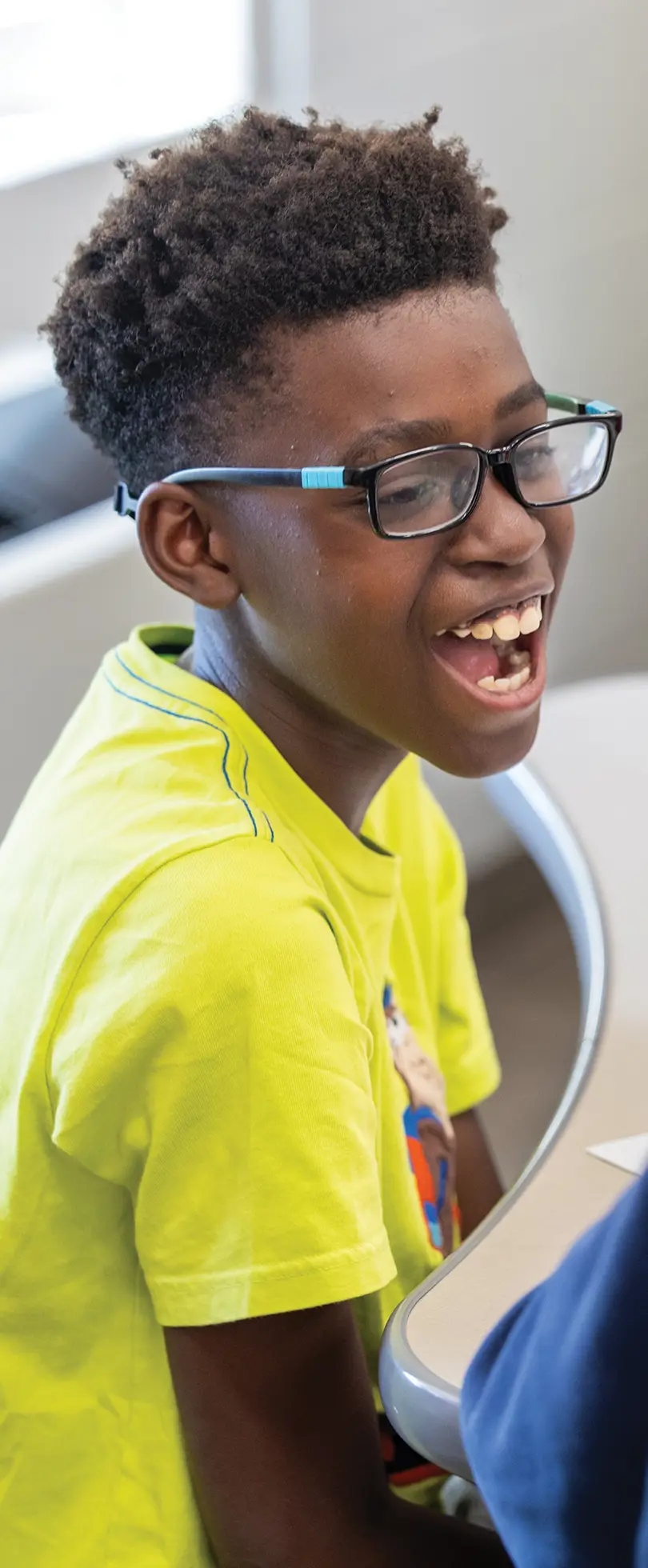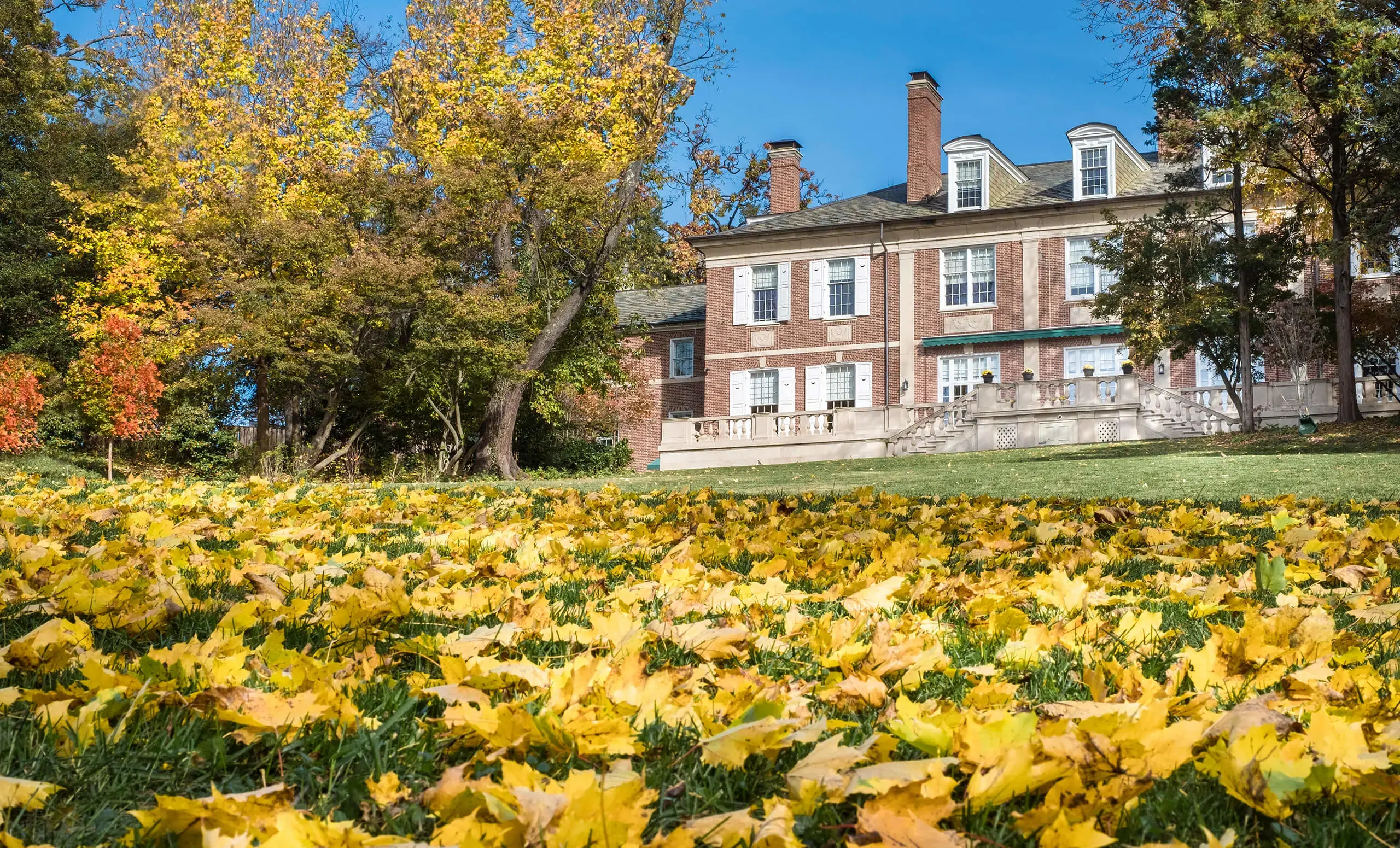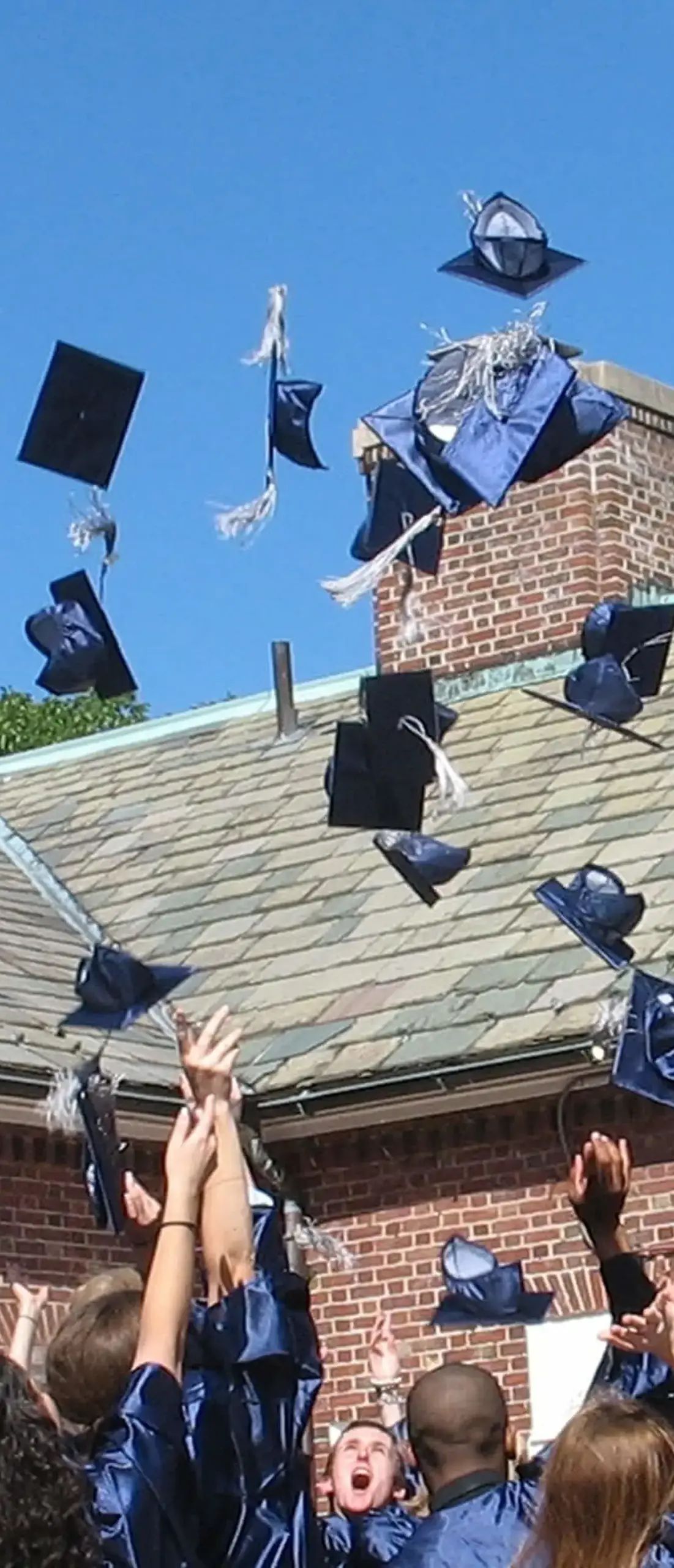SENIOR LEADERSHIP TEAM
The senior leadership team is composed of the following individuals:
| SUZANNA JEMSBY | Head of School |
|---|
|
Ms. Jemsby began her tenure at WIS after six years serving as Head of School at The Galloway School in Atlanta. At Galloway, she was recognized for strengthening the academic program and enrollment, and upgrading the school’s fundraising, marketing, and fiscal planning. Prior to Galloway, Ms. Jemsby was Executive Director of the Center for the Advancement and Study of International Education (CASIE), an educational non-profit that provides professional development training to independent and public schools across North America. Altogether, she has three decades of experience at international and independent schools in the U.S. and Europe—including Frankfurt International School, Internationale Schule Frankfurt-Rhein-Main, and Atlanta International School—and deep knowledge of the IB program. In addition to her native English, she speaks Swedish, German, and French—and is now working on increasing her proficiency in Spanish. Ms. Jemsby earned BA and MA degrees in Modern and Medieval Languages at the University of Cambridge, U.K. In 2015, she became a Fellow in the Head of School Program of the Klingenstein Center at Columbia University. Suzanna also attended the London College of Music, and is an avid cellist. She and husband Bjoern have three daughters, one who has graduated from WIS and two in the Upper School. |
| NATASHA BHALLA | Associate Head of School |
| Ms. Bhalla attended WIS for her primary school years, after her family moved to the United States from India. She earned a BA in English education at Virginia Tech and an MEd in social foundations of education at the University of Virginia. Before returning to WIS in 1999 to teach English, Ms. Bhalla spent three years teaching English in the Alexandria City Public School system. She was the WIS Middle School Principal from 2010-2016, after serving as the Assistant Principal for several years. |
| MARISA ALFORD | Director of Advancement |
| Ms. Alford ‘01 joined the Advancement team in 2014. This alumna returned to WIS with nearly ten years of development experience, first at the Manhattan Theatre Club, then at New York City Center, and, just prior to WIS, at Studio Theatre in Washington, DC. She obtained her BA in American Studies from Yale University. |
| RANDY ALTHAUS | Middle School Principal |
| Mr. Althaus came to WIS in 2014, after seven years at Jefferson Middle School in Arlington, VA. He is a Spanish speaker and was chosen to be a Fulbright-Hayes Scholar in Ethiopia. His education credentials include a BA from University of California, Berkeley in Linguistics, and an MA from Georgetown University in Teaching English as a Second Language. |
| IGNACIO BRAVO | CHIEF FINANCIAL OFFICER |
| Mr. Bravo joined WIS in 2024, after filling similar roles at organizations including CentroNía (an early childhood education provider), Apcela (a private equity global fiber network provider), and LTG Federal (a government contractor focused on networking and cybersecurity). Before that he was a Partner at Chesta Bravo, and spent 13 years at NII Holdings, which included a stint in Argentina. Ignacio is a CPA and holds a BA in Business Administration from Pontificia Universidad Católica Argentina Santa María de los Buenos Aires as well as a postgraduate degree in Finance from Universidad Torcuato Di Tella. |
| Chase Bruggeman | director of athletics |
|
Throughout his career, Mr. Bruggeman has crafted results-oriented strategy, championed collaboration, mentored coaches to ensure high-performance standards, elevated programme visibility, expanded varsity sports, created signature events that boost game attendance and school spirit, and overseen athletic schedules, facilities, and conference coordination. Before WIS, he served as Director of Athletics & PE Subject Coordinator at BASIS Independent McLean. Prior to that, he was DC Soccer Club’s Director of Performance & Head Coach (U12/U13 Boys) and the Arlington Soccer Association’s Director of Performance & Assistant Coach (ECNL U18/U19 Boys), where he developed elite training programmes for academy players and helped dozens of players secure collegiate commitments — including 17 D1 scholarships and 3 professional contracts. Earlier in his career, Mr. Bruggeman was Head Strength & Conditioning Coach for Men’s Soccer at the University of the District of Columbia. He earned his Bachelor of Science in Sports Management at Towson University. |
| Janet graber | executive assistant to the Heads of school |
| Ms. Graber has extensive experience in talent acquisition, managing high-performing teams, executing complex project management, and building strong relationships. Most recently, she was responsible for key personnel recruitment for USAID proposals. She has also held positions at The World Bank, Ford Foundation, and, early in her career, was assistant to the President of Radcliffe College at Harvard, her alma mater. Janet holds an MA in Education in Counseling and Consulting Psychology and a BA from Oberlin. |
| MARY HASTINGS MOORE | Director of Admissions and Financial Aid |
| Ms. Hastings Moore holds a BA and MA in art history from George Washington University. Before joining the WIS staff in 2003, she worked for over 12 years in marketing and sales for two telecommunications service companies. She also worked for five years in the membership office of the American Association of Museums. |
| JAVID MAJDI | Director of Information Technology |
| Mr. Majdi earned his BS from George Mason University. Prior to joining WIS in 2017, he worked as a Cloud Support Engineer at Amazon Web Services. Previously, he worked in various positions at different IT firms as a Senior Network Engineer, Solutions Architect, and IT Manager. He holds numerous industry-standard IT certifications such as Microsoft, Cisco, AWS, IBM, and Jamf. |
| Fiona mayer | Primary School Principal |
|
Dr. Fiona Mayer is a passionate international educator and leader who served as the Chief Education Officer for St. Lucia. She was most recently Head of Primary School for Cedar International School in Tortola and also served in that role for Ecole Mondiale World School in Mumbai, India. Additionally, her background includes several years as Vice Principal of George Charles Secondary School in St. Lucia and of Danube International School in Vienna, Austria. Dr. Mayer has comprehensive experience as a school accreditor with the Middle States Association of Colleges and Schools and is a proud alumna of the University of Liverpool. |
| SARAH MERIANOS | Director of Extended Learning |
|
Ms. Merianos joined WIS as the Director of Extended Learning in 2023, with almost two decades of experience in educational program development and management. She previously served as the Director of Summer and Auxiliary Programs at the Green Acres School in Maryland, and Director of Summer Programs at the Madeira School in Virginia. Prior to her work within the independent school community, Ms. Merianos designed, managed, and facilitated programs focused on intergenerational learning experiences at The National Building Museum, the Sam & Alfreda Maloof Foundation for Arts & Crafts, and Los Angeles County Museum of Art. From 2006-2013, Ms. Merianos directed a large sailing and watersports camp for Girl Scouts of Eastern Massachusetts, spending many adventurous summers on Cape Cod. She holds a BFA in Art Education from Massachusetts College of Art & Design, and a MA in Nonprofit Management from Claremont Graduate University. |
| Francesca mulazzi | Upper School Principal |
|
Dr. Mulazzi is an international school leader, multilingual educator, and advocate for student well-being and progressive education. From 2019 to 2023, she served as Head of Upper School at Saint George’s School in Spokane, WA, before transitioning to her most recent role as High School Principal at the International School of Panama. She spearheaded transformational initiatives, including launching phone-free learning spaces, developing student advisory councils, and expanding mental health resources for students and social-emotional learning professional development for teachers. Her leadership is deeply rooted in building inclusive school cultures and fostering collaborative professional learning communities. Her teaching career spans multiple continents, disciplines, and curricula. She has taught English and French in Singapore, the USA, China, and Zambia, and she holds a K–12 Principal Certification from the New Hampshire Department of Education, an EdD in Leadership, Learning & Community from Plymouth State University, an MEd from the University of Oregon, and a BA in French and Italian Literature from the University of Vermont. |
| ELISE Stephenson | Director of the PDC @WIS |
| Ms. Stephenson is an experienced school leader with expertise in working with urban communities. Her experience centers around providing equitable and accessible learning opportunities for a diverse community of scholars. Prior to joining WIS in 2024, Ms. Stephenson was Chief Academic Officer for the Consortium of Catholic Academies of the Archdiocese of Washington. She began her teaching career as a middle school math teacher at the Sacred Heart School, moving into the role of principal after four years. She earned her BA in education from the University of North Carolina at Chapel Hill and her MEd from Notre Dame of Maryland University. |
| DALE TEMPLE | Director of Facilities and Operations |
| Prior to his arrival at WIS in 2013, Mr. Temple became Facilities Director of the Association of American Medical College in Washington, DC. He served as Facilities Director at the Seattle Country Day School from 1999-2010, where he supervised all aspects of the daily facility operations while also managing the school's large capital projects. Earlier in his career, he worked for the IKEA N.A. Group and for the University of Idaho. He received his BS from West Chester University and his CFM from the University of Washington. |
| CAROLINE WOOD | Director of Human Resources |
|
Ms. Wood came to WIS in 2019 after more than four years at the Galloway School in Atlanta, GA, where she served as director of Human Resources. Ms. Wood previously worked at the City Schools of Decatur in Decatur, GA, where she managed all aspects of human resources for nine schools and more than 700 employees. Ms. Wood began her career in education in the classroom as a second-grade teacher. She earned her Masters of Arts in Teaching from Emory University and a Bachelor of Arts in History and Political Science from the University of Rochester. Her work experience also includes working in investor services for Morgan Stanley in New York City and a firm in Washington, DC. |
| ALDAINE WYNTER | Director of International-Mindedness, Diversity, and Inclusion |
|
Mr. Wynter joined WIS in 2023, taking on the responsibility of becoming the School's first-ever Director of International-Mindedness, Diversity, and Inclusion. Previously, Mr. Wynter served as the Assistant Head of Pastoral and Operations at Wetherby Senior School in London. His responsibilities also extended to managing Wetherby's Equality, Diversity, and Inclusion initiatives. His work with diversity and inclusion began during his tenure at Dwight School London (his post prior to Wetherby); from 2020–2022 he was the Global Diversity and Inclusion Coordinator, developing and executing strategies and programs for Dwight campuses in London, New York, Shanghai, Dubai, and Seoul. Prior to moving into leadership roles, Mr. Wynter was a mathematics teacher. He has served as a mathematics examiner for the IB's Diploma Exams, and has also spoken at an IB conference on the subject of developing anti-racist strategies. He received his BEng in Robotics from the University of Plymouth and his MA in Social Justice & Education from University College London. |
| Racquel Yerbury | Director of Marketing and Communications |
|
At WIS, Ms. Yerbury leads a collaborative marketing and communications department that serves the school's mission and strategic goals. Before joining the team in early 2025, she was a vice president at an award-winning PR, marketing, and communications agency, where she executed myriad creative campaigns and content initiatives for Fortune 500 companies, startups, and nonprofits. She is a hands-on strategist, writer, and creator who knows the value of imagination and taking smart risks. For nearly five years, she also served as director of special projects and corporate communications at a tech startup. Prior to her decade in marketing, Ms. Yerbury taught upper school students, directed international programs, received a Fulbright and an NEH fellowship as an educator, embedded with Admissions and Advancement committees, and served on VAIS and AIMS accreditation teams. She was also the assistant dean of students at Shepherd University. She earned her MA in Greek & Latin and trained as a classical archaeologist. She has served Habitat for Humanity, the ASPCA, and other organizations. She also has been an FAA-certified private pilot since she was 19. |
MEET THE BOARD
The Head of School and one of the WIS Parents Association co-presidents are ex officio members of the Board.
| yasmin banaei: 2025–2028 |
|---|
|
Dr. Banaei is a medical doctor in the field of psychiatry who owns a practice offering psychotherapy and psychopharmacology to high-functioning adults. She has a special interest in populations who are experiencing major life transitions, in particular perinatal women and emerging adults. She also serves as adjunct faculty at the Georgetown University School of Medicine. On the WIS Board, Dr. Banaei sits on the Facilities Committee. She loves nearly all creative pursuits and has a not-so-secret mission of transforming her family’s home into an indoor jungle. |
| Kevin Batteh: 2024–2027 |
|
Mr. Batteh is a Partner at Delta Strategy Group, a government affairs firm focused on financial regulatory issues. He has previously worked in large law firms, on Capitol Hill, and for US and UK financial regulators. On the WIS Board, he currently serves on the Finance Committee and is the Chair of its Investment Subcommittee. He and his wife Sarah Alkenbrack have three children at WIS. When he isn't helping to shuttle kids to and from school and practice, he can be found walking his Pudelpointer Zeus around Tregaron. |
| noel bejarano: 2025–2028 |
|
Mr. Bejarano is the co-founder and CEO of Camino Capital Management, a private real estate investment firm with assets across the US. Camino principals are typically the largest investors in its projects and partner with a close network of co-investors. Prior to launching Camino, Mr. Bejarano held various leadership roles in Europe and the US at global real estate investment funds. Earlier in his career, he served as an officer in the US Army. He serves on the WIS Facilities Committee and is parent to a student in the Class of 2031. He’s also an enthusiastic SCUBA diver and has pursued aquatic adventures around the world. His favorite aquatic close encounters so far include those with manta rays and dolphins — and his least favorite was with hammerhead sharks. Still on the bucket list is whale sharks! |
| DAVID BRIGSTOCKE: 2022–2028 |
|
Mr. Brigstocke has spent most of his career in financial services, both at JPMorganChase and latterly as a financial consultant. On the WIS Board, he serves as Chair of the Finance Committee and is on the Investment Subcommittee and the Executive Committee. He grew up in London and DC, in a family with strong educational roots. In addition to WIS, he is on the US boards of two British schools, Westminster School and Magdalene College Cambridge, the latter where he met Head of School Suzanna Jemsby. In his spare time he enjoys flying small planes, with pilot’s licenses in both the UK and US. |
| MELISSA BURNETT: 2018–2026 (Chair) |
|
As Board Chair, Ms. Burnett has been instrumental in shepherding the execution and completion of Le Centre Brown, as well as all aspects of the WIS mission. She sits on all WIS Board committees. Her son is a member of the Class of 2030. Her expertise includes design, both interiors and decorative arts. |
| LEAH CHANG: 2023–2026 |
|
Ms. Chang currently has two children enrolled at WIS in the Classes of 2026 and 2029, as well as an older child who graduated with the class of 2022. On the WIS Board, she sits on both the Advancement and Governance Committees. An author and historian, she was a tenured professor of French literature and culture at The George Washington University before turning to writing full time. Her research and writing has taken her down some interesting and unexpected paths — she once spent a month in a monastery learning about medieval manuscripts and knows far too much about the workings and upkeep of the guillotine. She holds a PhD. |
| ding ding: 2025–2028 |
|
Mr. Ding is an economist with over 15 years of experience at the International Monetary Fund, specializing in macroeconomic research and policy analysis. He currently serves as IMF Mission Chief for Colombia and has led several high-profile IMF programs across Latin America. Originally from China, he earned his PhD in economics from Cornell University. At WIS, he contributes his expertise to the Finance Committee and Investment Subcommittee, and is a proud parent of two students in the Classes of 2031 and 2033. Once an avid soccer player, he now channels his passion into being a devoted spectator. |
| RACHEL FIRSCHEIN: 2021–2027 |
|
Ms. Firschein is Executive Director of Taxable Fixed Income Sales and Trading at Raymond James & Associates, She serves on the WIS Facilities Committee and the Investment Subcommittee of Finance. One of her daughters is a member of the Class of 2031; her older daughter also attended WIS through Grade 10. |
| WESLEY FLAMER-BINION: 2021–2027 |
|
Mr. Flamer-Binion is Director of Credit for Toronto-Dominion Bank's Investment Portfolio. On the WIS Board, he serves as Chair of the Facilities Committee and is a member of the Executive Committee. He's also a proud WIS graduate! |
| ALFONSO GARCIA MORA: 2024–2027 |
|
Mr. Garcia Mora is a Spanish national, with more than 25 years of experience working on finance and development. He has three kids currently at WIS in the Classes of 2026, 2033, and 2035. He sits on the WIS Board's Finance Committee. He holds a PhD in Economics and currently serves as vice president for Europe, Latin America, and the Caribbean at the International Finance Corporation (IFC) of The World Bank Group. Before that, he spent several years working in Europe, Asia, and other regions with different positions in the private sector and at The World Bank. He loves spending time with his wife and kids, skiing, sailing, cycling, and running. Recently, he achieved the milestone of having run in 100 different countries! |
| LORENZO GIORGIANNI: 2023–2026 |
|
Mr. Giorgianni has been an economist ever since he graduated from high school in the South of Italy in 1983. He spent 17 years working at the International Monetary Fund, mostly focusing on managing financial crises. For the last 12 years, he has worked in the research group of a macro hedge fund, Tudor Investment Co. His main task is to advise portfolio managers on their asset allocation decisions. He took a 15-month hiatus between the end of college in Italy and the start of graduate school in the US to serve as an officer in the Italian Navy. He serves on WIS Board's Finance Committee and Investment Subcommittee. His children are WIS alumni from the Classes of 2021 and 2024. He loves traveling with his family and watching sports, including his favorite tennis player, Jannik Sinner, and A.S. Roma, the only soccer team worth supporting — in his not-so-humble opinion. |
| CRISTINA GOMEZ: 2023–2026 |
|
Ms. Gomez is Practice Vice President in the Marketing & Communications Research Practice at Gartner. She serves as Co-Chair of the WIS Governance Committee and serves on the Advancement Committee. Her two daughters are enrolled at WIS, in the Classes of 2033 and 2036. |
| maya grassi: 2025–2028 |
|
Ms. Grassi is General Counsel at Ocean Conservancy, a nonprofit environmental public charity. She is an attorney with over twenty years of experience counseling nonprofit, tax-exempt organizations, including public charities, associations, and foundations. On the WIS Board, she serves on the Governance Committee. She has twins in fifth grade who have attended WIS since Preschool. She is a long-time DC resident, and in addition to her children, she shares her home with her husband, Toby, and an irascible thirteen-year-old toy poodle named Ollie. |
| SCOT HAGERTHEY: 2024–2027 |
|
Mr. Hagerthey is National Program Director for the Sustainable and Healthy Communities Research Program at the US Environmental Protection Agency. He serves on the WIS Advancement Committee and his son is a member of the Class of 2029. |
| SOPHIE HAWKINS: 2020–2026 |
|
Ms. Hawkins' expertise is in investment banking and asset management. She serves on both the WIS Advancement and Facilities Committees. Her children are WIS alumnae from the Classes of 2022 and 2023. She and her family have been vital to the vision, building, and completion of Le Centre Brown. |
| NICHOLAS HILL: 2023–2026 |
|
Mr. Hill is a Partner at Bates White Economic Consulting. On the WIS Board, he serves as Chair of the Governance Committee and is a member of the Executive Committee. Not only is he a WIS alumnus from the Class of 1991, he's also a parent, with his son a member of the Class of 2036. |
| ROHIT KUMAR: 2021–2027 (vice chair) |
|
Mr. Kumar is a Principal and Co-Leader of the Washington National Tax Office for PwC. He serves as Vice Chair of the WIS Board of Trustees and Chair of the Advancement Committee. His daughter is a member of the Class of 2028. Born in Boston and raised in Dallas, he holds a BA from Duke University and a JD from the University of Virginia School of Law. In his free time he enjoys skiing, scuba diving, and playing tennis. A lifelong fan of Taylor Swift, he will regularly work snippets of her lyrics into his client presentations. |
| MYRA RIGGS: 2020–2026 |
|
Ms. Riggs is a leader in compliance, insurance, and risk management for American Express. She serves on the WIS Board's Finance Committee. She has two sons at WIS in the Classes of 2027 and 2031. |
| FLAVIA ROSEMBUJ: 2024–2027 |
|
Ms. Rosembuj, a Spanish national, joined the World Bank in 2005 and has held a variety of leadership roles across both the World Bank and its private sector arm, the International Finance Corporation. Before joining the Bank, Ms. Rosembuj practiced as a transactional lawyer at leading law firms in France, the United Kingdom and Spain. Additionally, she has been a visiting professor at Columbia University and is a frequent guest speaker at Stanford Law School. Beyond the WIS Board, for more than a decade she served as a Board member of DC Greens, a nonprofit dedicated to advancing food security. Altogether, she brings more than 20 years of experience at the intersection of international law, finance, and climate policy. She holds a PhD and an LLM from the University of Paris Sorbonne. Outside of work, she enjoys gardening, hiking, riding motorcycles — though her daily commute is on a bright red Vespa. She and her husband have a daughter graduating from WIS in 2028, as well as older stepchildren who are already out of college. |
| Carlo sdralevich: 2023–2026 |
|
Mr. Sdralevich is Assistant Director and Chief, General Resources and SDR Division of the Finance Department at the International Monetary Fund. He serves on the WIS Board's Governance Committee. One of his sons is a member of the Class of 2027. |
| jessica springsteen: 2025–2028 |
|
Ms. Springsteen is an Equity Partner at Clifford Chance, one of the world’s leading international law firms, where she specializes in energy and infrastructure law across Latin America. She serves on several nonprofit boards, including Edu-Futuro, The Clifford Chance Foundation, The Catholic University of America’s Board of Visitors, and Imagination Stage. On the WIS Board, she serves on the Finance Committee. She has been part of the WIS community for 15 years — both of her sons are WIS lifers, having attended since pre-K, with her elder son graduating in May 2025 and her younger son set to graduate in May 2026. She is trilingual in Spanish, English, and Italian — and learned Italian while studying abroad in Perugia, where she also developed a lifelong love of Italian cooking and style! |











